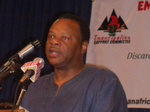|  |
Molefi Asante lectures at Kwame Ture Series
Posted: Monday, June 13, 2005 TriniVew.com
 The Emancipation Support Committee of Trinidad and Tobago launched the first lecture of the Kwame Ture Memorial Series yesterday evening with a lecture delivered by the Molefi Kete Asante. Professor Molefi Asante who chairs the African-American Studies Department at Temple University, is credited with having coined the word 'Afrocentrism'. He is the author of a number of books including The Afrocentric Idea, Erasing Racism and The Egyptian Philosophers: Ancient African Voices from Imhotep to Akhenaten, Classical Africa and The Painful Demise of Eurocentrism. The Emancipation Support Committee of Trinidad and Tobago launched the first lecture of the Kwame Ture Memorial Series yesterday evening with a lecture delivered by the Molefi Kete Asante. Professor Molefi Asante who chairs the African-American Studies Department at Temple University, is credited with having coined the word 'Afrocentrism'. He is the author of a number of books including The Afrocentric Idea, Erasing Racism and The Egyptian Philosophers: Ancient African Voices from Imhotep to Akhenaten, Classical Africa and The Painful Demise of Eurocentrism.
Tracey Wilson, committee member of the ESC, in his introductory remarks, invoked the name of famous historical personalities such as Yaa Asantewaa, Hapshepsut and Nzinga. Wilson highlighted the contributions of Dr Mark Dean, Phillip Emeagwali and Lewis Latimer, African inventors who revolutionized modern technology and warned against the inadequate intake of history.
Speaking to a packed audience at City Hall, the feature speaker Professor Molefi Kete Asante outlined his interactions with Kwame Ture and the lessons that he was able to learn from him. He revealed to the appreciative audience that, in addition to Ture's unwavering dedication to the struggle, one of the important lessons from Ture's life was the way he linked the continent of Africa to the Diaspora.
Professor Asante informed the audience that Afrocentricity is a misunderstood term especially as whenever the media tries to explain it they get it wrong. He defined Afrocentricity as being about explaining the world from an African viewpoint. "This means that African people, i.e., people of African descent, have the right and the responsibility to view the world through their own eyes, to interpret the world through their own analysis, to study and teach world history from their viewpoint as subjects and not objects of history, and to approach the study of history as makers of history, not victims of history."
Asante emphasized that Afrocentricity is not the opposite of Eurocentricity as widely believed and that explaining things from an African perspective is not about being against other peoples. He described Eurocentricity as an ethnocentric perspective that places its worldview, tastes and attitudes above others and imposes itself on everybody else. As an example he mentioned how European formal dress (suit and tie) is often seen as the only acceptable formal wear. In contrast to Eurocentricity, he explained that Afrocentricity is not about imposing but rather is focused on locating the beginning of humanity and human civilization in Africa.
Emphasizing that no one is born a slave, Asante explained that no African slaves were brought to Trinidad, Barbados, Haiti, Virginia, Georgia, but rather Africans were enslaved on their arrival to the New World. Brutality, the banning of African names, culture and ancestral memories were all part of the process of making a slave, he noted. Delving into history, he refuted the notion that the few Africans who collaborated with the Europeans in kidnapping and enslaving Africans, diminishes the responsibility of Europeans for the slave trade. He stressed the importance of teaching African children about the painful experiences of the Middle Passage so that they can understand upon whose shoulders they stand. "Our children must have an appreciation for history" he said.
He made mention of the thousands of years of African achievements in African before the advent of the European slave trade. Africans were fishermen/women, priests, artisans, blacksmiths and makers of history. Asante called attention to the fact that long before Greece existed African were building pyramids. He made mention of Tutmoses, Ramases and the Queen Hapshepsut who sent a delegation to Punt (Somalia) during her reign. He rebutted the mainstream view that Egypt (Kemet) is not part of Africa, and highlighted the intent of Western scholars to separate Kemet from Africa. He further outlined evidence that showed that Kemet was essentially a Black nation, quoting the observations of the European historian Herodotus who documented his observations of the Egyptians as black with wolly hair.
Other events leading up to the 2005 Emancipation Day celebrations on August 1st include a Trans-Atlantic Expo, an International Business Forum, a Youth Day, a pan night and a reggae concert featuring Bunny Wailer, Freddy McGregor and Gregory Issacs. The official website for the Emancipation Celebrations is www.panafricanfestival.org. The theme of this year's Emancipation celebration is "Discarding Broken Chains... Discovering Unbroken Connections."
View pictures from the lecture at:
www.triniview.com/album/Molefi-Kete-Asante
 Printer friendly version Printer friendly version
 Send page by E-Mail Send page by E-Mail
Homepage | Reasonings | Features | Forums | Interactive

|  |  |
|

